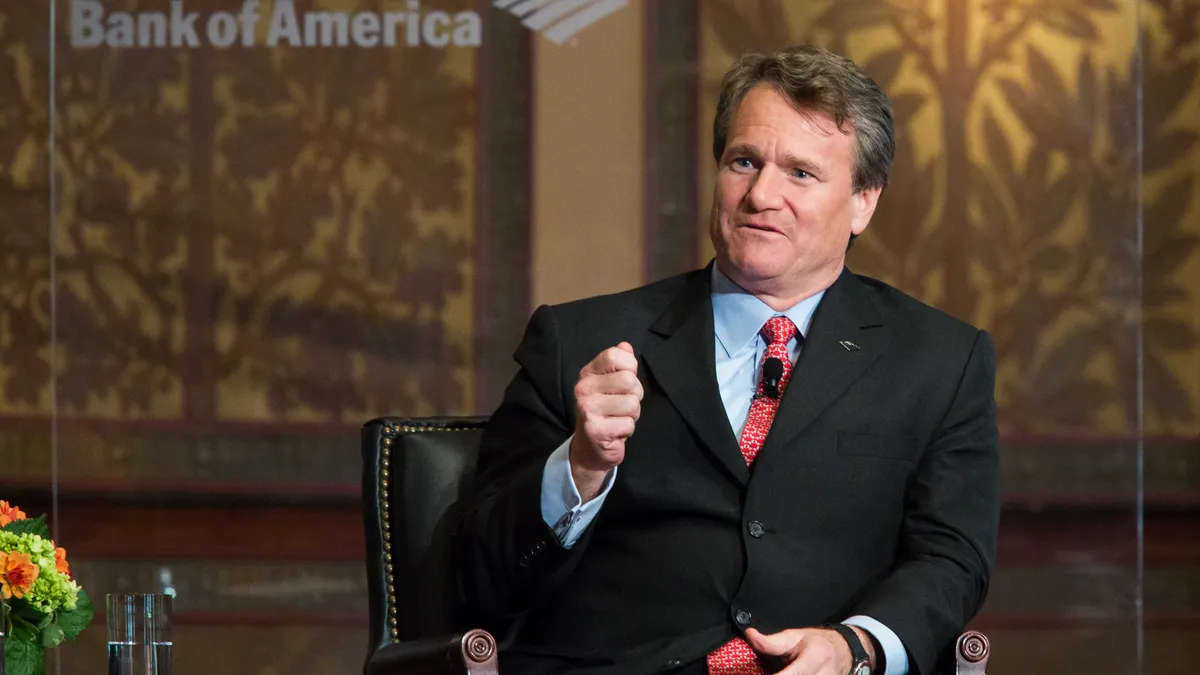Bank of America will release a revamped office-return policy in the next six to eight weeks, CEO Brian Moynihan told an audience Tuesday at a banking conference in New York.
"We’ll have more flexibility than we did, on paper, before,” he said, according to Reuters. But, he added, “we'll have more formality to the flexibility.”
The policy aims to strike a balance such that it is specific to each of the bank’s units — “You can’t generalize,” Moynihan said, according to Bloomberg — but also consistent and fair across the business. The policy will vary, however, based on job responsibilities and other factors, the CEO said.
"We have 210,000 people and there’s literally 210,000 different views of what people want,” Moynihan said.
Those varying interpretations will have informed the nascent policy. The bank is incorporating feedback from staff surveys into its new standards, Bloomberg reported.
The announcement came on what may stand as a watershed day for post-COVID work. Goldman Sachs on Tuesday stopped requiring employees to be vaccinated against COVID-19 before entering its offices. (That policy doesn’t yet apply to New York City offices.) Tuesday was also Day 2 for a Morgan Stanley initiative discontinuing COVID testing requirements for office workers.
Those policy changes only surfaced last week. Other banks had earmarked Sept. 6 as a day of transition months ago. Capital One reopened its doors to all U.S. employees Tuesday for the first time in more than two years. The bank’s hybrid work policy encourages — but doesn’t require — in-office attendance Tuesday through Thursday. Employees without proof of vaccination must meet COVID testing requirements, the bank specified in May.
Still other banks have launched less specific pleas to ramp up office attendance. Jefferies CEO Rich Handler last week told employees the bank “need[s] everyone back in our offices on a consistent basis” during the fourth quarter. Royal Bank of Canada CEO Dave McKay asked employees, “as we move into fall … to come together more often in person to work and collaborate.”
Analysts and observers, however, are divided as to whether the Labor Day shift in attitude will have legs.
“I think that you’ll see, certainly if we go into a bit of a recession or whatever we’re in now, as the leverage swings back to employers, they’ll use that leverage momentum to insist that people be back to the office,” Jeff Blau, CEO of Related Cos., a real estate developer invested in Manhattan’s Hudson Yards, told Bloomberg.
Another real estate developer, Bill Rudin, CEO of Rudin Management, told the wire service that office attendance may spike in reaction to other economic consequences.
“As you start seeing some layoffs happening, people will say, ‘Whoa, I don’t want to be laid off, I want to be in the office and have bosses see that I’m working really hard,’” Rudin said.
However, Bhushan Sethi, joint global leader for people and organization at PricewaterhouseCoopers, told Bloomberg that Labor Day may not mark the “great reckoning” office-work proponents may hope.
“Banks will be loath to be too aggressive,” he said.
It should be noted, though, that even the setting in which Moynihan teased Bank of America’s upcoming policy change had a post-COVID air.
Manhattan’s packed Pierre Hotel on Tuesday played host to the Bank Policy Institute and The Clearing House’s annual conference — the first time the gathering has convened in person since 2019.











